Information for the public
Cataracts: the care you should expect
Cataracts are a common eye problem where the lens in your eye becomes cloudy. They cause blurry, misty vision and sight loss. You can get cataracts in one or both of your eyes and they normally happen as part of getting older. In cataract surgery, the cloudy lens is replaced with an artificial one. This type of surgery is the most common procedure done in the NHS and is safe and works very well. We want this guideline to make a difference to people with cataracts by making sure:
- people with cataracts are referred to an eye clinic as soon as their day-to-day life is affected
- people get better information about cataracts and how they can be treated, so they understand how the different options may affect their eyesight
- both eyes are treated, if needed
- hospitals minimise the risk of complications or errors during surgery
- if there are any complications after the surgery, these can be dealt with quickly by specialist services.
Making decisions together
Decisions about treatment and care are best when they are made together. Your health professionals should give you clear information that includes the risk and benefits of surgery for you, and talk with you about your options. They should listen carefully to your views and concerns.
To help you make decisions, think about:
- What matters most to you – how much is your quality of life being affected by your current level of vision?
- What are you most worried about – are there risks or downsides to having cataract surgery that worry you more than others?
- How will the treatment affect your day-to-day life?
- What happens if you don’t want to have treatment?
If you can’t understand the information you are given, tell your health professional.
Read more about making decisions about your care.
In the news
Read NICE news about how this guideline will help.
Take a patient-centred approach to treating cataracts

Where can I find out more?
NHS Choices has more information about cataracts.
Find your nearest local Healthwatch.
The organisations below can also give you more advice and support.
- Royal National Institute of Blind People (RNIB), 0303 123 9999
- Eye Health UK, 0845 128 5007
- Look after your eyes (information for the public from the Royal College of Optometrists)
- Thomas Pocklington Trust
- SeeAbility, 0137 275 5000
NICE is not responsible for the content of these websites.
We wrote this guideline with people who have been affected by cataracts and staff who treat and support them. All the decisions are based on the best research available.
ISBN: 978-1-4731-2707-4
Additional resources
This page was last updated: